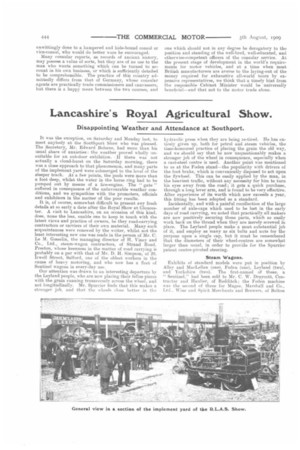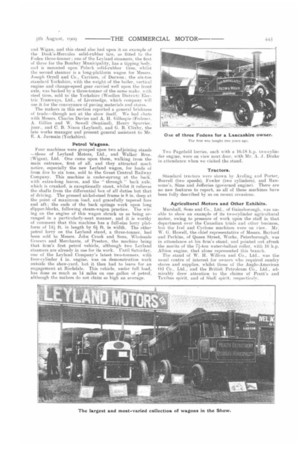Lancashire' s Royal Agricultural Show.
Page 2

Page 3

If you've noticed an error in this article please click here to report it so we can fix it.
Disappointing Weather and Attendance at Southport.
It was the exception, on Saturday and Monday last, to meet anybody at the Southport Show who was pleased. The Secretary, Mr. Edward Boliane, had more than his usual share of anxieties : the weather proved wholly unsuitable for an out-door exhibition. • If there was not actually a cloud-burst on the Saturday morning, there was a close approach to that phenomenon, and many parts of the implement yard were submerged to the level of the sleeper track. At a few points, the pools were more than a foot deep, whilst the water in the horse ring had to be pumped out by means of a tire-engine. The " gate " suffered in consequence of the unfavourable weather conditions, and we sympathise with the promoters, officials and exhibitors in the matter of the poor results. It is, of course, somewhat difficult to present any fresh details at so early a date after the Royal Show at Gloucester. A visit to Lancashire, on an occasion of this kind, does, none the less, enable one to keep in touch with the latest views and practice of owners, be they road-carrying contractors or carriers of their own material. Many such acquaintances were renewed by the writer, whilst not the least interesting new one was made in the person of Mr. C. Le M. Gosselin, the managing director of H. Viney and Co., Ltd., steam-wagon contractors, of Strand Road, Preston, whose keenness in the matter of road carrying is probably on a par with that of Mr. D. H. Simpson, of 20, Irwell Street, Salford, one of the oldest workers in the cause of heavy motoring, and who now has a fleet of Sentinel wagons in every-day use.
Our attention was drawn to an interesting departure by the Leyland people, who are now placing their felloe pieces with the grain running transversely across the wheel, and not longitudinally. Mr. Spurrier finds that this makes a stronger job, and that the wheels close better in the hydraulic press when they are being re-tired. He has entirely given up, both for petrol and steam vehicles, the time-honoured practice of placing the grain the old way, and we should say that he now unquestionably makes a stronger job of the wheel in consequence, especially when a cast-steel centre is used. Another point was mentioned to us at the Foden stand—the popularity with drivers of the foot brake, which is conveniently disposed to act upon the flywheel. This can be easily applied by the man, in the heaviest traffic, without any necessity for him to turn his eyes away from the road; it gets a quick purchase, through a long lever arm, and is found to be very effective. After experience of its worth which now exceeds a year, this fitting has been adopted as a standard.
Incidentally, and with a painful recollection of the large number of axle-caps which used to be lost in the early days of road carrying, we noted that practically all makers are now positively securing these parts, which so easily work back on the thread when they are merely screwed in place. The Leyland people make a most substantial job of it, and employ as many as six bolts and nuts for the purpose upon a single cap, but it must be remembered that the diameters of their wheel-centres are somewhat larger than usual, in order to provide for the Spurner patent centre-pivoted steering.
Steam Wagons.
Exhibits of standard models were put in position by Alley and MacLellan (one), Foden (one), Leyland (two), and Yorkshire (two). The first-named of these, a " Sentinel," had been sold to Mr. C. W. Draycott, Contractor and Haulier, of Reclditch ; the }Wien machine was the second of three for Magee. Marshall and Co., Ltd.. Wine and Spirit Merchants and Brewers, of Bolton
and Wigan, and this stand also had upon it an esample of the Dook's-Hercules solid-rubber tire, as fitted to the Foden three-tonner ; one of the Leyland steamers, the first of three for the Bombay Municipality, has a tipping body, and is mounted upon Polack solid-rubber tires, whilst the second steamer is a long-platform wagon for Messrs. Joseph Orrell and Co., Carriers, of Darwen ; the six-ton standard Yorkshire, with the weight of the boiler, vertical engine and change-speed gear carried well upon the front axle, was backed by a three-tonner of the same make, with steel tires, sold to the Yorkshire (Woollen District) Electric Tramways, Ltd., of Liversedge, which company will use it for the conveyance of paving materials and stores.
The makers in this section reported a general briskness of trade—though not at the show itself. We had chats with Messrs. Charles Davies and A. H. Gillespie (lender's). A. Gillies and W. Sewell (Sentinel), Henry Spurrier, junr., and C. B. Nixon (Leyland), and G. B. Clixby, the late works manager and present general assistant to Mr. E. A. Jarmain (Yorkshire).
Petrol Wagons.
'emir machines were grouped upon two adjoining stands —those of Leyland Motors, Ltd., and Walker Bros. (Wigan), Ltd. One came upon them, walking from the main entrance, first of all, and they attracted much notice, especially the new Leyland wagon, for loads of from five to six tons, sold to the Great Central Railway Company. This machine is under-sprung at the back, with extra-long leaves, and the " through " back axle, which is cranked, is exceptionally stout, whilst it relieves the shafts from the differential box of all duties but that of driving. The pressed nickel-steel frame is 8 in. deep at the point of maximum load, and gracefully tapered fore and aft; the ends of the back. springs work upon long slipper-blocks, following steam-wagon practice. The wiring on the engine of this wagon struck us as being arranged in a particularly-neat manner, and it is worthy of comment that this machine has a full-size lorry platform of 14i ft. in length by 6Aft. in width. The other petrol lorry on the Leyland stand, a three-tonner, had been sold to Messrs. John Crook and Sons, Wholesale Grocers and Merehants, of Preston, the machine being that firm's first petrol vehicle, although two Leyland steamers are already in use for its work. Until Saturday, one of the Leyland Company's latest two-tonners, with four-cylinder 4 in. engine, was on demonstration work outside the show-yard, hut it then had to leave for an engagement at Rochdale. This vehicle, under full load, has done as much as 14 miles on one gallon of petrol, although the makers do not claim so high an average. Two Pagefield lorries, each with a 16-18 lip, two-cylinder engine, were on view next door, with. Mr. A..1. Drake in attendance when we visited the stand.
Tractors.
Standard tractors were shown by Aveling and Porter, Burrell (two speeds), Fowler (two cylinders), and Ransome's, Sims and jefferiea (governed engine). There are no new features to report, as all of these machines have been fully described by us on recent occasions.
Agricultural Motors and Other Exhibits.
Marshall, Sons and Co., Ltd., of Gainsborough, was tillable to show an example of its two-cylinder agricultural motor, owing to pressure of work upon the staff in that department over the Canadian trials and other business, but the lye) and Cyclone machines were on view. Mr. W. G. Howell, the chief representative of Messrs. Barford and Perkins, of Queen Street, Works, Peterborough, was in attendance at his firm's stand, and pointed out afresh the merits of the 7:1-ton water-ballast roller, with 16 h.p. Albion engine, that alone represented this branch.
The stand of W. H. Willcox and Co., Ltd., was the usual centre of interest for owners who required sundry stores and supplies, whilst those of the Anglo-American Oil Co., Ltd., and the British Petroleum Co., Ltd., admirably drew attention to the claims of Pratt's and Taxihus spirit, and of Shell spirit, respectively.




















